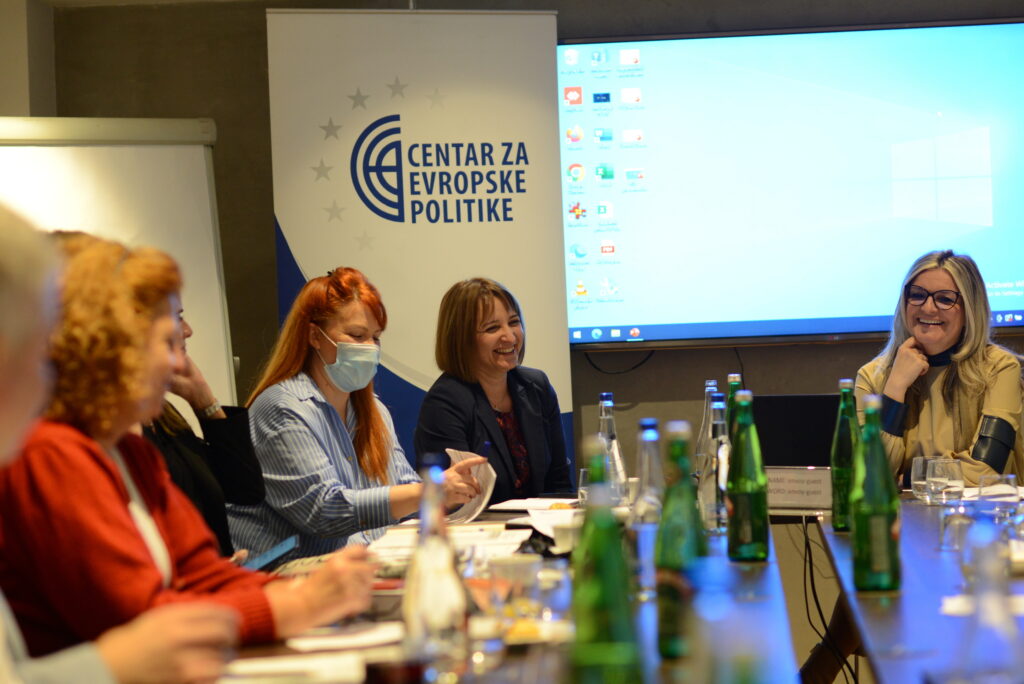Headquarters: Svetog Nauma 7, 11000
Office address: Đorđa Vajferta 13, 11000
Phone:: +381 11 4529 323

23 October 2023 – Today in Belgrade, the European Policy Centre (CEP) organised an event focused on the discussion about the ERP document. The event was organised as a part of the Operating grant – CEP’s Annual Work Programme 2023, in the framework of CEP’s Strategic plan for Good Governance and with the support of EU Delegation to Serbia. The goal of the event is to deepen the cooperation between civil society and public administration through the timely inclusion of the Intersectoral Working Group of the National Convention on the European Union in Serbia (NCEU) for ERP in the process of defining structural reforms that would find their place in the final version of the document.
Representatives of all relevant institutions attended the event, including the EU Delegation to Serbia and representatives of NCEU. The Economic Reform Programme (ERP) is the most important strategic document in the economic dialogue between the European Union (EU) and the candidates (and potential candidates) for EU membership. It is also, together with the Fiscal Strategy, the umbrella economic document of the Republic of Serbia because its goal is the overall improvement of the management of economic policies and economic development. The purpose of this document is to prepare the country for participation in the economic and fiscal supervision process, which is carried out in all EU member states (European Semester).

Starting in 2015, the ERP is prepared annually, with projections of development and structural reforms to be implemented over the next three years. The preparation of ERP in the Republic of Serbia is coordinated by the Ministry of Finance, together with the Public Policy Secretariat of the Republic of Serbia and more than 1000 representatives of the state and public administration gathered within the Working Group of the Government of the Republic of Serbia participated in the process.
In 2023, the European Commission decided to significantly change the approach to creating ERP. The guidelines of the European Commission for the 2024-2026 cycle envisage the definition of only six structural reforms, two for each of the three areas identified: Competitiveness, Sustainability and Resilience, Human Capital and Social Policies.

About the six proposed structural reforms, which were presented in detail at the meeting by the representatives of the competent institutions, comments and suggestions were made by representatives of the MRG for ERP, after which a constructive and intensive discussion was held. At the meeting, it was once again confirmed that the cooperation between the institutions of the Government of the Republic of Serbia, which created the ERP document, and civil society through NCEU is an example of good practice that should be spread through the Western Balkans region. The presence of many representatives from public administration and the civil sector indicates an indisputable interest in active participation in shaping this public policy and its importance for economic reforms. This dialogue is carried out under the auspices of NCEU and its MRG for ERP, which, from the first years of preparation of this document, regularly submits its proposals to the Government Working Group and the Ministry of Finance, and advocates the participation of civil society in the process of ERP preparation in the earliest stages of the cycle and before the formulation of the priority reforms.

The need for even more intense cooperation, further strengthening the mutual trust between the civil sector and the state administration, and fostering an open dialogue, regardless of certain differences, was confirmed on both sides. The necessity of a more significant space for the influence of civil society on the formulation of structural reforms in the final ERP document was emphasised, and their role in monitoring the ERP implementation process was highlighted. In addition, the involvement of civil society will contribute to greater visibility and transparency of the process, as well as informing the general public about the importance of the Economic Reform Programme for further increasing the competitiveness of the national economy, greater economic growth and development, as well as creating new jobs and conditions for a better life for citizens.
At the end of the meeting, the Ministry of Finance representatives informed the attendees about further steps and activities that should be implemented in the short term, considering the plan for the ERP document to be adopted by the Government in December 2023.